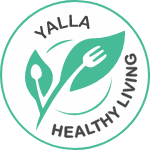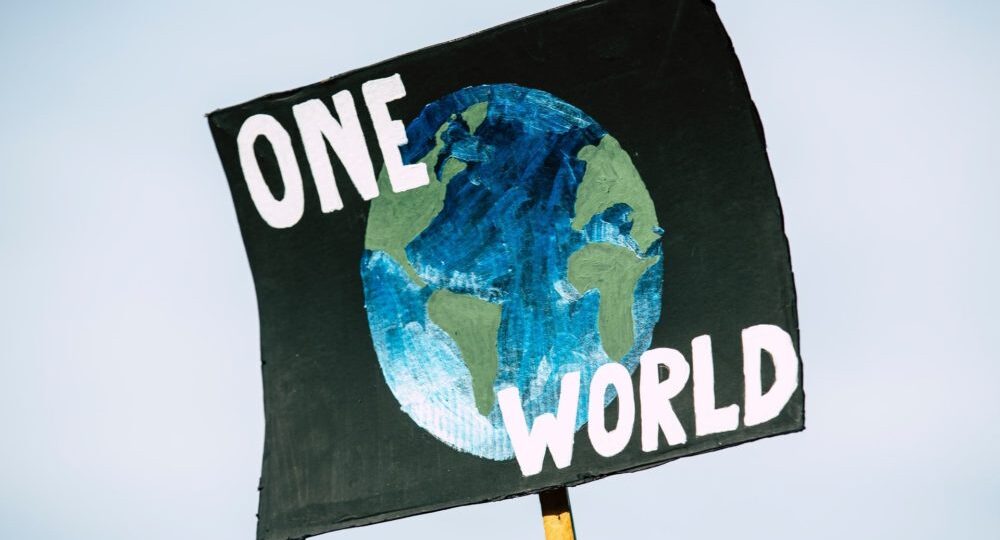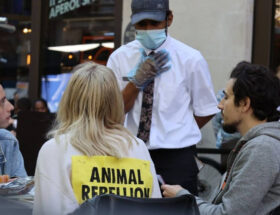If there was one key takeaway my colleague Louisa Burwood-Taylor and other attendees took from the COP26 climate summit in Glasgow, UK, last October, it was the need for corporate accountability.
The world’s climate crisis has finally taken center stage with more attention, headlines, and public commitments than ever before across industries.
Major food and ag corporations have made numerous public climate commitments in recent years, mostly focused on slashing greenhouse gas emissions and reaching carbon neutrality in the coming years or decades. Agrifood corporate climate commitments went full-on mainstream in 2020 and 2021, with mammoth corporations like General Mills and multi-billion restaurant chains like McDonald’s making pledges to pursue regenerative farming practices or reach net zero in 2050. COP26 accelerated the number of corporate commitments.
And while overall it’s positive news, “corporate accountability” was declared missing from the COP26 agenda, and many now ask how meaningful the litany of climate commitments actually is or, frankly, whether they’re just good marketing.
Just this week, German think tank NewClimate Institute took 25 of the world’s major corporations to task and found that most are committing to less than they declare in the news. “Net-zero” is only about 40% emissions reductions in many cases and “targets for 2030 fall well short of the ambition required to align with the internationally agreed goals of the Paris Agreement and avoid the most damaging effects of climate change,” reads the “Corporate Climate Responsibility Monitor 2022″ the think tank published this week.
As AFN’s own Wolf of Wheat Street recently said, “you shouldn’t make promises you can’t keep in front of journalists…”
Holding companies to account for their commitments is impossible if you can’t keep track of them, however. So as we organized ourselves over here at AFN to better enable us to check in with companies at reasonable junctures, we thought we would publish a list of agrifood corporate climate commitments to help our readers also keep track — and perhaps encourage them to also hold these companies accountable.
We’ll update it frequently as more companies join the list and as climate commitments evolve.
This list is unlikely exhaustive. We welcome suggestions of agrifood corporate climate commitments we may have missed or not yet heard about. Send me a note here.
| Company | Key commitment | First announced |
| AB InBev | 2025: 35% GHG reduction2040: Net zero | 2018 |
| Addo Food Group | 2035: Net zero | 2021 |
| Arla Foods | 2030: 63% Scope 1+2 GHG emissions reduction | 2021 |
| Bacardi | 2025: 50% Scope 1+2 GHG emissions reduction; 20% Scope 3 reduction | 2018 |
| Barilla | 2030: 25% Scope 1+2 GHG emissions reduction; 26% Scope 3 | 2019 |
| Cargill | 2030: 30% reduction per ton of product sold2050: Net zero | 2019 |
| Carlsberg | 2030: Net zero from breweries; 30% emissions reduction across entire value chain | 2017 |
| Carrefour | 2040: Net zero | 2020 |
| Chipotle | 2030: 50% Scope 1+2+3 GHG emissions reduction | 2021 |
| Chiquita | 2030: 30% Scope 1+2 GHG emissions reduction | 2021 |
| Conagra Brands, Inc. | 2030: 25% Scope 1+2; 20% Scope 3 per metric ton of material | 2020 |
| Coop Sverige AB | 2026: 50% Scope 1+2; 25% Scope 3 | 2019 |
| Dairy Farmers of America | 2030: 30% Scope 1+2+3 emissions reduction | 2020 |
| Danone | 2030: 50% Scope 1+2+3 emissions reduction2050 Net zero | 2017 |
| Dole | 2030: 30% emissions reduction in “group- wide”marketplace net zero from Dole-owned farms | 2020 |
| Domino’s | 2035: 67% Scope 1+2 emissions reduction; 40% Scope 3 2050: Net zero | 2022 |
| DSM | 2030: 20% GHG emissions reduction | 2018 |
| Fresh Del Monte | 2030: 12.3% Scope 3 emissions reduction 2035: 27.5% Scope 1+2 emissions reduction | 2020 |
| General Mills | 2030: 30% Scope 1+2+3 emissions reduction 2050: Net zero | 2020 |
| Grupo Bimbo | 2050: Net zero | 2021 |
| Heineken | 2030: 90% Scope 1+2 emissions reduction; 21% Scope 3 reduction 2040: Net zero | 2018 |
| Hilton Food Group | 2030: 25% Scope 1+2 emissions reduction; 12.3% Scope 3 reduction | 2021 |
| Kellogg Company | 2030: 47% Scope 1+2 emissions reduction; 20% Scope 3 reduction | 2015 |
| Keurig Dr Pepper | 2030: 30% Scope 1+2 emissions reduction; 15% Scope 3 reduction | 2019 |
| Maple Leaf Foods Inc. | 2030: 30% Scope 1+2 emissions reduction; 30% Scope 3 reduction | 2019 |
| Mars | 2050: 67% Scope 1+2+3 | 2017 |
| McCain Foods Limited | 2030: 52% Scope 1+2 emissions reduction; 31% Scope 3 reduction | 2021 |
| McCormick & Company | 2025: 20% Scope 1+2 emissions reduction 2030: 16% Scope 3 reduction | 2019 |
| McDonald’s | 2050: Net zero | 2021 |
| Moët Hennessy | 2030: 50% Scope 1+2+3 emissions reduction | 2021 |
| Molson Coors Brewing | 2025: 50% Scope 1+2 emissions reduction | 2019 |
| Mondelez International | 2025: 10% Scope 1+2+3 emissions reduction | 2020 |
| Nestlé | 2025: 20% Scope 1+2+3 emissions reduction 2030: 50% Scope 1+2+3 2050: Net zero | 2020 |
| Panera | 2050: “Climate positive” | 2021 |
| PepsiCo | 2030: 75% Scope 1+2 emissions reduction; 40% Scope 1+2 emissions reduction | 2021 |
| Pernod Ricard | 2030: 30% Scope 1+2 emissions reduction | 2019 |
| Pilgrim’s Pride | 2030: 30% Scope 1 + 2 emissions reduction2040: Net zero | 2021 |
| Restaurant Brands International | 2030: 50% Scope 1+2 emissions reduction2050: Net zero | 2021 |
| Sainsbury’s | 2030: 50% Scope 1+2 emissions reduction; 30% Scope 3 reduction 2040: Net zero in its own operations | 2020 |
| Smithfield Foods | 2030: Net zero in US company-owned operations; 30% GHG emissions reduction across entire domestic supply chain 2050: Net zero | 2020 |
| Sodexo | 2025: 34% carbon emissions reduction2045: Net zero in UK & Ireland | 2019 |
| Starbucks | 2030: 50% Scope 1+2+3 emissions reduction | 2021 |
| Stonyfield | 2030: 30% Scope 1+2 emissions reduction; 30% Scope 3 | 2019 |
| Suntory Beverage & Food | 2030: 50% Scope 1+2 emissions reduction; 30% Scope 3 2050: Net zero | 2021 |
| Sysco | 2030: 27.5% Scope 1+2 emissions reduction | 2021 |
| Target | 2040: Net zero | 2019 |
| Tesco | 2025: 60% Scope 1+2 emissions reduction 2030: 17% Scope 3 2035: Net zero for its own operations | 2017 |
| The Coca-Cola Company | 2040: Net zero | 2021 |
| The Hershey Company | 2030: 50% Scope 1+2 emissions reduction; 25% Scope 3 | 2021 |
| The J.M. Smucker Company | 2030: 28% Scope 1+2 emissions reduction; 22% Scope 3 | 2021 |
| The Southern Co-operative | 2030: 50% Scope 1+2 emissions reduction; 17% Scope 3 | 2021 |
| Tyson Foods, Inc. | 2030: 30% Scope 1+2 emissions reduction; 30% per ton of finished meat for poultry, port, and beef Scope 3 | 2018 |
| Unilever | 2025: Net zero Scope 1+22039 Net zero | 2010 |
| Walmart | 2025: 35% Scope 1+2 emissions reduction 2030: 60% Scope 1+2 emissions reduction 2040: Net zero | 2016 |
| Wendy’s | Setting science-based targets by end of 2023 | 2021 |
| Yum Brands | 2030: 46% emissions reduction2050: Net zero | 2021 |










